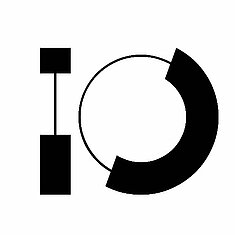The winners of the 10th edition of the Gerard & Anton Awards

The tenth presentation of the Gerard & Anton Awards, the 100th winner…. With more than 300 visitors, the event was bigger than ever before. And as presenters Beatrix Bos and Bert-Jan Woertman said, “We have rightly had a lot of attention in recent months on the content and consequences of Project Beethoven. But now it is time to let the allegro of the startup community follow that composer’s andante!”
The Gerard & Anton Awards is the annual election of the ten most promising startups in the Brainport Eindhoven region. During the sold-out event at the High Tech Campus, 91 through 100 winners received awards. In the coming days, we will have extensive interviews with them on Innovation Origins. Here are the reasons why the jury chose these startups.
The 2024 winners:
- Vitalfluid
- Upyther
- Sirius medical
- TracXon
- Senergetics
- Veridis
- Sandgrain
- Dembrane
- Whispp
- SCIL Nanoimprint Solutions
- Gouden Peertje: Starnus
The judges’ assessment
The ten (plus one) winners were selected from a longlist of more than seventy candidates. “Certainly half of them could have been on stage in the same way,” said jury chairman Stijn Steenbakkers. It typifies the consistently high quality of the candidates. This is the jury’s verdict for each winner:
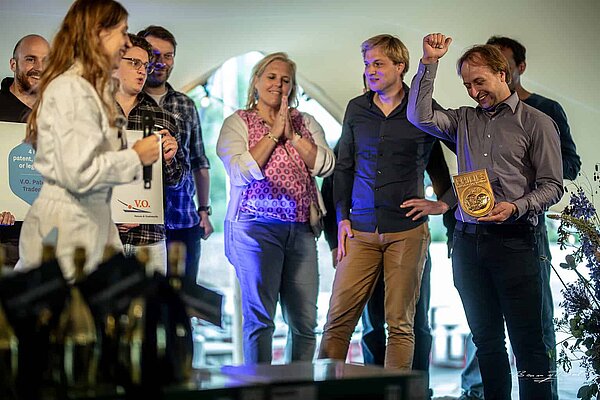
Vitafluid
When lightning strikes water, water has a temporary disinfecting effect. VitalFluid mimics this natural phenomenon. By further refining, validating, and marketing the technology developed at Eindhoven University of Technology, the company is working on a new and sustainable method for fertilization and an alternative to chemical pesticides in greenhouse farming.
The startup focuses on natural nitrogen, seed treatment, plant health, and water treatment. Plasma applications in other areas, such as medical and cleaning, also remain in the picture. Vitalfluid had been on the judges’ long list for several years, so it is no surprise that the team is now on the podium. Vitalfluid has many irons in the lightning-hot fire for various markets, and the judges expect several to lead to success.
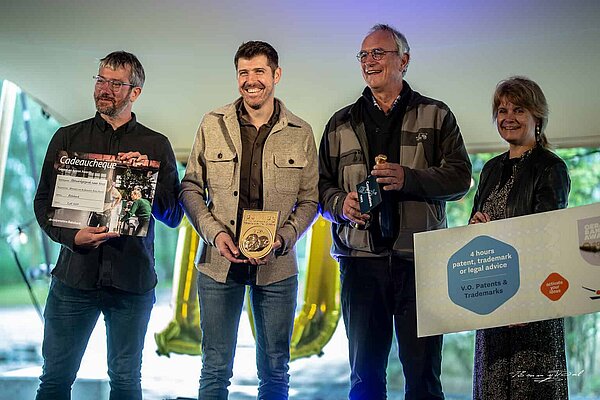
Upyther
Each year, more than one million people worldwide are affected by peritoneal cancer. It is often the result of metastasis from colon, stomach, or ovarian cancer, for example, to the peritoneal cavity. Various treatment options are often still available for patients with metastases in the lungs and liver, but they are limited for metastases to the peritoneum. Therefore, patients with peritoneal cancer have the worst prognosis, but Upyther wants to change that. UPyTher is developing customized drug delivery solutions. A single-shot therapy (a gel) for peritoneal cancer enables local continuous exposure to the drug to improve therapeutic efficacy, patient recovery, and survival. This is what the judges call a life-changing startup!
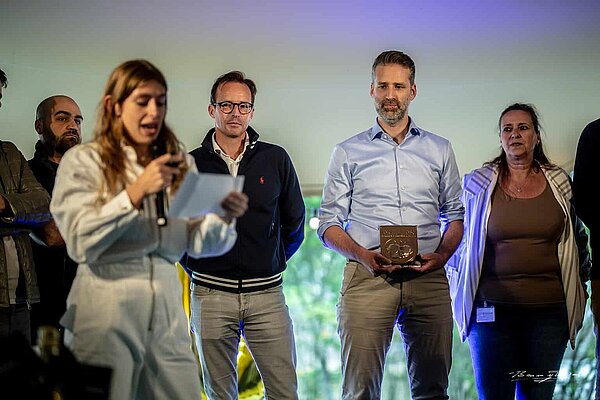
Sirius Medical
Sirius Medical is a spin-off of the Netherlands Cancer Institute, whose roots are firmly rooted in the surgical clinic. The founders saw the need and opportunity to simplify and improve localization technology for the surgical removal of breast cancers. This work resulted in Sirius Pintuition, which provides efficient tumor removal in a simple, accurate, and affordable manner. The goal is to provide accurate devices that deliver optimal patient care while remaining affordable. Sirius has developed at lightning speed and performs over 20,000 treatments worldwide in more than 200 U.S., Europe, Australia, and New Zealand centers. What appealed to the jury was how Sirius combines necessary medical steps with sound entrepreneurship while making healthcare cheaper.
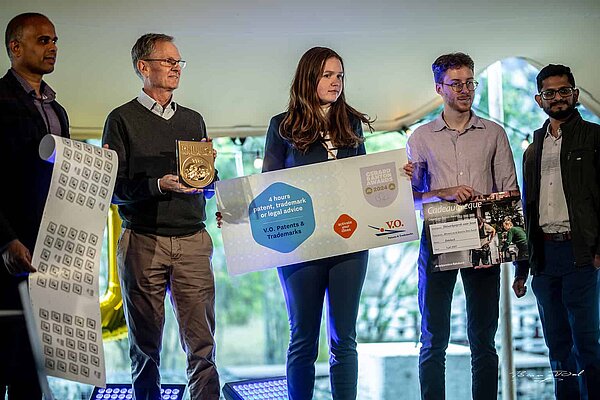
TracXon
Holst technology on Hastelweg. Tracxon produces “roll-to-roll” printed electronics, which can be used, for example, for medical patches. Eventually, wearables, patches, or textile applications featuring sensors and electronics will emerge. The functions of those applications can be very different but always revolve around translating certain body information into valuable data. Tracxon’s technology can measure everything, including heart rate, blood sugar, brain activity, and perspiration. Whereas previously, this could only be done with complicated (and extensive) devices, the TNO technology allows incorporating the sensors in clothing, plaster, or a bracelet so that the user no longer notices anything. Together with a group of partners, Tracxon is building an actual Patch Factory – and the jury sees this as a typical Brainport quality: by working together, we all become more robust, and Tracxon has understood this very well.
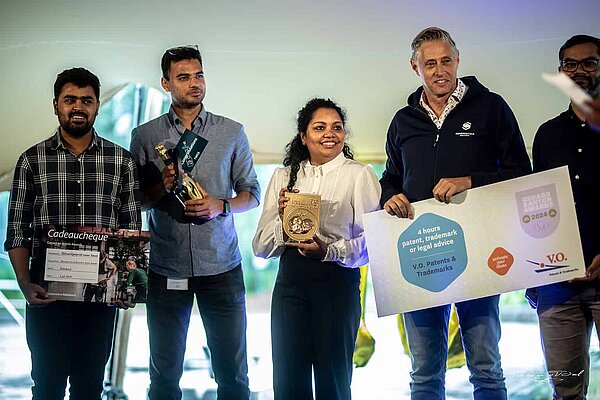
Senergetics
Founded only two years ago by Anitha and Frank Jacobs, Senergetics is already revolutionizing the process industry. Senergetics succeeds in using photonics technology to extend the life of industrial processes. With integrated photonics sensor solutions using optical fibers with sensors powered solely by light, Senergetics’ systems see things hidden from the rest of the world. These advanced sensors are also designed for extreme and hazardous environments, including explosive atmospheres and undersea environments.
By using Senergetics technology, companies can proactively predict maintenance needs, leading to lower costs, minimal downtime, and reduced safety risks. This is also done with unparalleled accuracy and reliability, with more than 30,000 sensors in one system, making the judges giddy. Higher safety in uncertain times touches not only the jury but our entire industrial world. That photonics brings us closer to those goals and doesn’t surprise us here on campus.
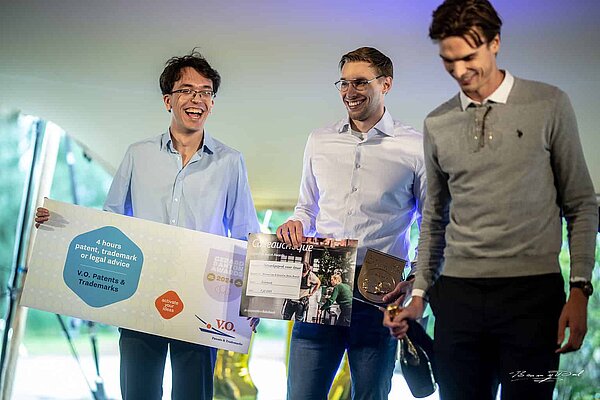
Veridis
Veridis believes in a circular economy where plastics retain their value and quality. MADSCAN analysis technology can accurately distinguish between different polymer fractions in large volumes and complex plastic batches with >99% accuracy. This helps the environment and the user’s wallet: after all, the commercial value of a product that has gone through MADSCAN increases by leaps and bounds.
What touched the jury is that an immense global problem – the almost impossible desire to recycle plastic – is coming within reach through Veridis. Moreover, Veridis makes it feasible for plastic producers to comply with the new laws and regulations. We need a circular future. Veridis is showing us the way.
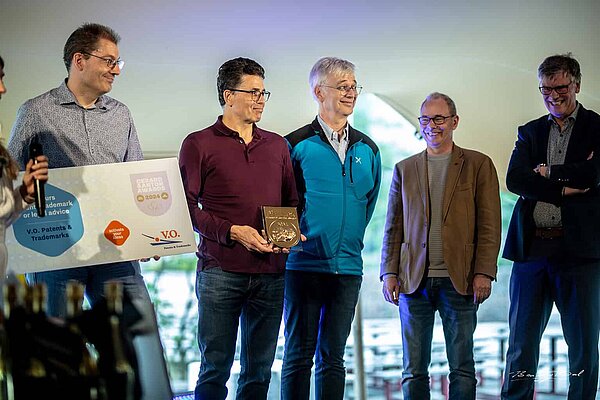
Sandgrain
With the ever-increasing connectivity of systems worldwide and the importance of the Internet of Things, the security of the ever-faster data becomes paramount. Identity verification is a critical vulnerability of this relatively new and ever-expanding ecosystem. Sandgrain is working to create a world where data is secure, networks can be trusted, and sovereignty is valued. SandGrain takes cybersecurity to the next level by using an electronic trust anchor as a robust “barcode” for security.
Sandgrain‘s universal authentication platform works for any device within the Internet of Things. The system combines a secure cloud platform with a token attached to the device. The judges, themselves more active in the cloud than they’d like, could suddenly vividly imagine the lack of security for their entire digital belongings. But once they recovered from that scare, they were sure that a party like Sandgrain would be essential in our “connected” society.

Dembrane
Dembrane has developed an online participation platform that extracts insights from structured and unstructured dialogues. Artificial intelligence can thus not only solve an acute problem for a company but ultimately even achieve a better-functioning democracy. For example, it is working with the municipalities of Eindhoven and Helmond on an AI-supported open data platform to help the cities become climate-neutral by 2030. It is also running the Brainwaves project to better understand the wishes and ideas of citizens in Eindhoven through conversations between people who have never met before. Two such city conversations have now been successfully completed.
What touches the jury with Dembrane is that this startup shows that AI can lead to something beautiful. Amidst all the AI horror stories, that’s a welcome change – and hope for our sometimes ramshackle democracy.
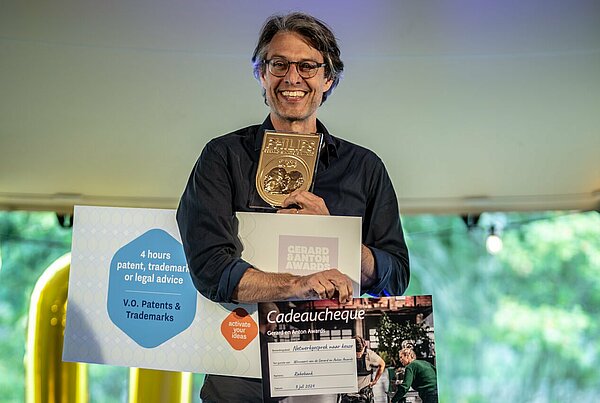
Whispp
A startup from Leiden on the stage of the Gerard & Anton Awards? Yes, thanks to the interference (and investment) of Lumo Labs, Brainport has grown a little bit bigger again. And rightly so, because the jury is heavily impressed by what Whispp has already shown, but much more so by the impact this startup is undoubtedly going to make. Whispp uses Artificial Intelligence to give people with speech impairments a strong voice (back). Whispp’s real-time speech-support technology and calling app transforms speech affected by stuttering, throat cancer, vocal cord paralysis, and A.L.S. into the person’s original, natural voice. This could just be a godsend for the estimated 300 million people who have severe speech impediments.
A solution that enables people to communicate again, the jury takes a deep bow for that.
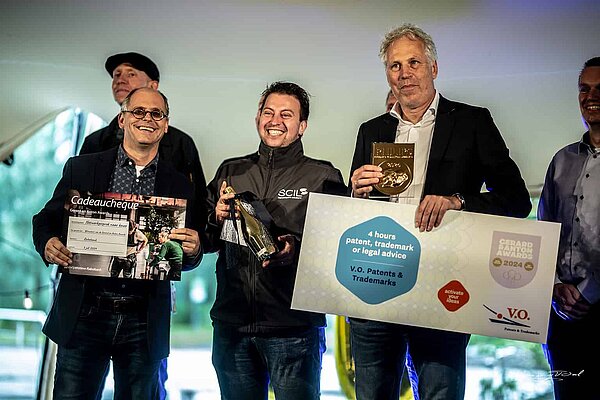
SCIL Nanoimprint Solutions
Based on Philips technology, SCIL has developed nanoimprint lithography equipment that can produce large quantities of devices, such as AR smart glasses. SCIL also does this at a fraction of the cost of alternatives such as DUV and EUV tools.
SCIL is a child of the region in many ways. In 2015, Philips Research and Philips IP&S decided to build a business case around SCIL technology. The first step was to design and build a fully automated machine for imprinting nanopatterns on substrates. In 2017, SCIL installed the first devices; since then, VDL has been responsible for production. Thanks to an extensive investment round, SCIL was able to extricate itself from Philips last year, finally turning the nearly 10-year-old company into a startup. Originating from Philips, active in lithography, with warm contacts with VDL, located on the High Tech Campus, and with a particularly promising technological solution, the jury obviously could not resist that combination.
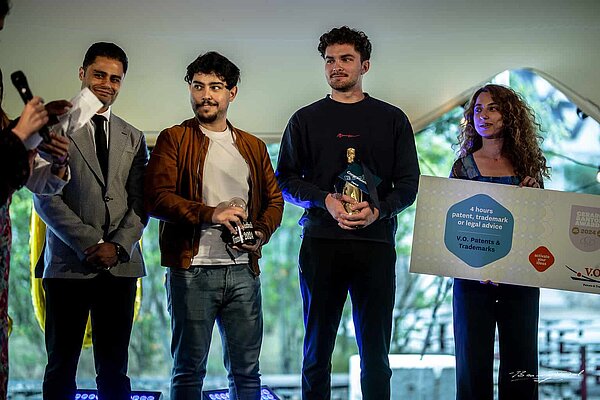
Gouden Peertje: Starnus Technology
Starnus Technology developed a unique modular robot technology, which several customers have already implemented. Starnus’ FMRS (Fully Modular Robotic System) technology, which is currently patent-pending, provides customers with full customization capabilities, creating the possibility of the perfect robotic solution for every need. At the same time, the modular system allows for plug-and-play adjustments of the robots on demand and on-site with minimal interruption to ongoing operations. Customers thus never risk making the wrong investments, as the robot fleet can always be adjusted to maintain maximum efficiency.
The Peertje jury is impressed by the maturity of this young team. Twice, Starnus has already been at the CES in Las Vegas, while the company has only been in business for two years. The strategic partnership with Rhenus Warehousing Solutions is another proof of the professional approach of this ambitious team. Starnus has already been a finalist in several startup competitions, but now it immediately grabs a big prize: The Golden Lightbulb is yours!
The Gerard & Anton Awards were made possible in part by EY, Rabobank, V.O. Patents & Trademarks, TWICE, Kadans Science Partner, Braventure, Lumo Labs, Municipality of Eindhoven, High Tech Campus, Philips, Goevaers & Znn. B.V. and DeepTechXL.
